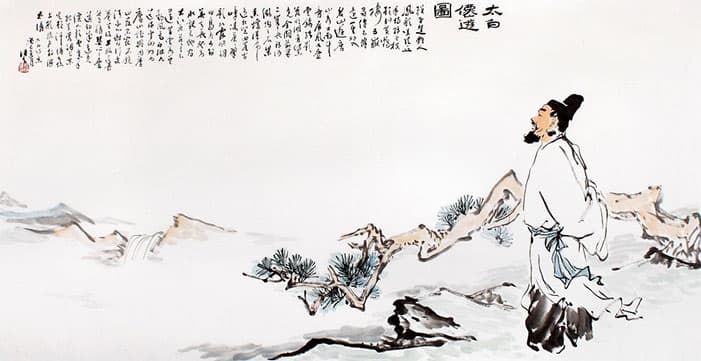A Song of Lu Mountain to Censor Lu Xuzhou
- Poetry of Li Bai (Li Po)

我本楚狂人,凤歌笑孔丘。
手持绿玉杖,朝别黄鹤楼。
五岳寻仙不辞远,一生好入名山游。
庐山秀出南斗傍,屏风九叠云锦张,影落明湖青黛光。
金阙前开二峰长,银河倒挂三石梁,香炉瀑布遥相望,回崖沓嶂凌苍苍。
翠影红霞映朝日,鸟飞不到吴天长。
登高壮观天地间,大江茫茫去不还。
黄云万里动风色,白波九道流雪山。
好为庐山谣,兴因庐山发。
闲窥石镜清我心,谢公行处苍苔没。
早服还丹无世情,琴心三叠道初成。
遥见仙人彩云里,手把芙蓉朝玉京。
先期汗漫九垓上,愿接卢敖游太清。
I am the madman of the Chu country
Who sang a mad song disputing Confucius.
...Holding in my hand a staff of green jade,
I have crossed, since morning at the Yellow Crane Terrace,
All five Holy Mountains, without a thought of distance,
According to the one constant habit of my life.
Lu Mountain stands beside the Southern Dipper
In clouds reaching silken like a nine-panelled screen,
With its shadows in a crystal lake deepening the green water.
The Golden Gate opens into two mountain-ranges.
A silver stream is hanging down to three stone bridges
Within sight of the mighty Tripod Falls.
Ledges of cliff and winding trails lead to blue sky
And a flush of cloud in the morning sun,
Whence no flight of birds could be blown into Wu.
...I climb to the top. I survey the whole world.
I see the long river that runs beyond return,
Yellow clouds that winds have driven hundreds of miles
And a snow-peak whitely circled by the swirl of a ninefold stream.
And so I am singing a song of Lu Mountain,
A song that is born of the breath of Lu Mountain.
...Where the Stone Mirror makes the heart's purity purer
And green moss has buried the footsteps of Xie,
I have eaten the immortal pellet and, rid of the world's troubles,
Before the lute's third playing have achieved my element.
Far away I watch the angels riding coloured clouds
Toward heaven's Jade City, with hibiscus in their hands.
And so, when I have traversed the nine sections of the world,
I will follow Saint Luao up the Great Purity.
Seven-character-ancient-verse
- Why Chinese poems is so special?
- The most distinctive features of Chinese poetry are: concision- many poems are only four lines, and few are much longer than eight; ambiguity- number, tense and parts of speech are often undetermined, creating particularly rich interpretative possibilities; and structure- most poems follow quite strict formal patterns which have beauty in themselves as well as highlighting meaningful contrasts.
- How to read a Chinese poem?
- Like an English poem, but more so. Everything is there for a reason, so try to find that reason. Think about all the possible connotations, and be aware of the different possibilities of number and tense. Look for contrasts: within lines, between the lines of each couplet and between successive couplets. Above all, don't worry about what the poet meant- find your meaning.
List of Chinese poets
Pre-Qin Poetry
Han poetry
Ban Gu Cao Cao Cao Zhi Cao Pi Cai Wenji Kong Rong Liu Bang Liu Che Qin Jia Ruan Ji Su Wu Wang Can Xiang Yu Xu Gan Zhang Heng AnonymousSix Dynasties Poetry
Tao Yuanming Zhang HuaTang poetry
Bai Juyi Bao Junhui Cen Shen Chen Zi'ang Cui Hao Chang Jian Cui Tu Chen Tao Du Fu Du Mu Du Shenyan Dai Shulun Du Xunhe Du Qiuniang Gao Shi Gu Kuang Gao Pian Han Yu He Zhizhang Han Hong Huangfu Ran Han Wo Huang Chao Jia Dao Jiaoran Jin Changzu Li Bai (Li Po) Li He Li Shangyin Liu Yuxi Liu Zongyuan Luo Binwang Li Qi Liu Changqing Lu Lun Li Shen Li Yu Li Qiao Li Yi Liu Fangping Liu Zhongyong Li Ye Meng Haoran Meng Jiao Ma Dai Pei Di Qian Qi Quan Deyu Sikong Shu Song Zhiwen Shen Quanqi Shangguan Wan'er Xuanzong of Tang Wang Bo Wang Changling Wang Wei Wang Zhihuan Wei Yingwu Wen Tingyun Wang Han Wei Zhuang Wang Wan Xue Tao Xu Hun Xu Hui Yuan Zhen Yu Xuanji Yu Shinan Yuan Jie Zhang Jiuling Zhang Ji Zhang Hu Zhang Zhihe Zu Yong Zhang Xu Zhu Qingyu Zheng Tian Zhang Bi Zhang RuoxuSong Poetry
Cai Xiang Chao Chongzhi Fan Chengda Fan Zhongyan Huang Tingjian He Zhu Kou Zhun Jiang Kui Lu You Li Qingzhao Liu Yong Mei Yaochen Ouyang Xiu Pan Lang Qin Guan Qian Weiyan Su Shi Su Zhe Song Qi Wang Anshi Wen Tianxiang Weng Juan Xin Qiji Yang Wanli Yue Fei Yan Jidao Yan Shu Ye Shaoweng Zeng Gong Zhang Xian Zhou Bangyan Zhu Shuzhen Zhu Xi Zhou DunyiYuan poetry
Bai Pu Guan Hanqing Ma Zhiyuan Xu Zaisi Yang WeizhenMing poetry
Chen Jiru Tang Yin Tang Xianzu Xu Wei Yu Qian Yang ShenQing poetry
Cao Xueqin He Shuangqing Nalan Xingde Pu Songling Tsangyang Gyatso Wang Guowei Yuan Mei Zheng Xie Zhao Yi